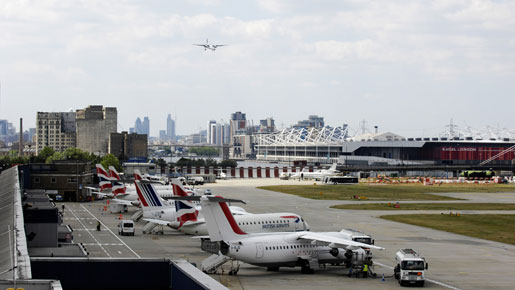
What a job. Richard Gooding OBE has to win with environmentalists, security experts, government ministers plus encourage – and keep – new airline alliances to his patch of East London, otherwise known as London City Airport, deep in London’s Docklands. Oh, and he’s also got to handle the 2012 London Olympics rush too.
That’s a tough remit by any standards but Gooding is a man with plenty of experience (he joined British European Airways as a general apprentice in 1966). Much of the change, such as the growing trend for airline alliance presence, is welcome though, especially after a hard recession with deep discounting and airline capacity cuts, not to mention increasing competition from rail operators.
“The fact that all three new airline alliances wanted to be represented here and in substance is great. It does help to concentrate the mind. But overall we welcome it. It helps us because we tend to get a more mature relationship with airlines now rather than reaction on an individualistic basis.”
All routes lead to City Airport
Gooding predicts more airline consolidation in future, and of course, new routes from City Airport. Twice-daily flights to Copenhagen with BA commenced at the end of October from City and a similar arrangement to Stockholm starts in mid January. “Florence with Air France follows at the start of February and BA have just announced two new routes for next summer for Malaga and Faro, a push by BA to exploit opportunities.”
There’s also increasingly a commercial imperative to use off-peak capacity by the airlines when they can – hence the proliferation of popular, easy-to-get-to leisure destinations. Its simply good commercial sense.
The recent new BA route to New York’s JFK is going well – no hitches. “It’s an all-business class service, twice a day, stops for a refuel at Shannon. The beauty of this service is there’s no immigration once you get to NYC. It’s all been done at Shannon. Sounds a bit quirky, but everyone who tries it once thinks it fantastic. It’s a service that’s now matured after 15 months – not a single cancellation and punctuality is excellent.”
Winning hearts and minds
Meanwhile environmental pressures mount. Gooding is currently locked in a battle with groups from a neighbouring borough. Some are deeply opposed to the idea of City Airport expanding its commercial footprint by 50 percent. Residents’ argue the move will bring more noise and pollution.
However Gooding says City Airport contributes around £500m a year to London’s economy, not to mention supporting almost 3,000 jobs. It’s a tough battle to win hearts and minds when you combine environmental concerns and NIMBYISM (not in my back yarders).
“We would only seek approval for expansion if we could demonstrate a fully manageable impact on the environment. Noise and emissions are party of any major planning approval and London’s economy would face a further set of challenges if we weren’t here.”
If you press him, Gooding admits the environmental question is the biggest issue airlines and airports have to face – the permission to grow – for the next five to ten years. “That’s the challenge, to satisfy people that the growth of aviation is a good thing. That it creates economic wellbeing and helps our economy survive and prosper.”
Indeed. A recent survey estimated that £197m was spent by business tourists coming through City airport plus £115m spent by leisure tourists – a huge amount. Not to mention £71m gained from productivity benefits thanks to journey time savings. Another £21m in air passenger duty was raised and £100m through operations and businesses at the airport.
“Britain remains an island,” Gooding adds. “But in the short run we haven’t won that argument. The decision to not approve the planned new runways at Heathrow, Gatwick and Stansted is indicative that the airline industry is on the back foot. We haven’t persuaded the man in the street of its importance yet.”
Security must change
Another hot issue for this airline boss is security. Though airline industry security can save lives, many travellers feel security has become too heavy-handed, too reactive to the bigger picture. It’s also been a big change for airports, of course. They’ve gone from a place where security was relatively low-profile to a situation where on-the-ground security has now become their biggest on-the-ground staff presence.
“We do think security may have got too big and complex. We’re very keen for alternatives to be explored. We need more intelligence-led security; a proper overview of where and how people are travelling is intrusive, but it also makes security work. We should be more on the front foot, industry-wide. Maybe it could be done,” he acknowledges, “with a lighter touch.”
Gooding makes the point that security now is often the only part of the airport where his business actually has a dialogue with their client. “So to do that service right you need to have your security staff properly trained and motivated. They’re the frontline troops of our business, it’s important to get it right.” Also, within the year travellers will be increasingly labelling the bags themselves.
But getting that balance right is something Gooding, you suspect, is already managing, despite the challenges.

